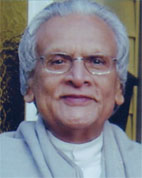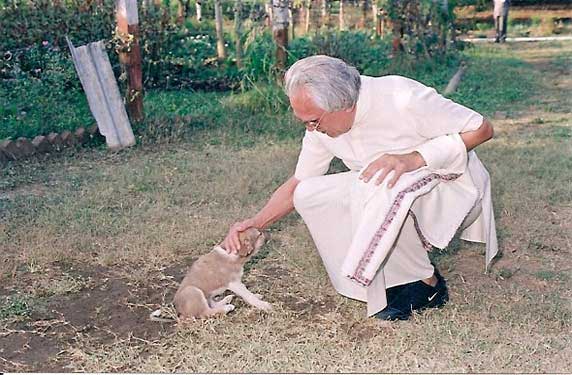

Jain Meditation International Center
My dear One and All ~~ Namaste!
The following message is to help one and all to observe, during PARYUSHANA: FESTIVAL OF FORGIVENESS from Sept. 2 to 9, 2013, the VEGAN way for spiritual growth.
Loving Blessings,
Jain Meditation Int'l Center
Message of Jain Master Gurudev Chitrabhanu
Nature’s bounties, beauty and wonders are limitless. She has blessed mankind in abundance; but with certain inherent control mechanisms. She has her own rules and regulations, which man needs to follow, for his own well-being and spiritual growth. She has also been kind enough to give intelligence and discretionary powers to man. But, man in his greed, many a time, does not understand nature’s checks and balances. Nature then is forced to checkmate him, for his own good. For example, if man succumbs to his palate and becomes its slave, he loses control over his thoughts, speech and actions, and also suffers ill-health.
Many of us are vegetarian. We eat plant-based food. We believe in ‘Ahinsa’ which is non-violence or having reverence for all forms of life. We not only believe in ‘Ahinsa’, but we are practitioners of ‘Ahinsa’. We have minimised our needs by becoming or remaining vegetarian.
Though being vegetarian is excellent for man’s physical as well as spiritual health, it is not enough. We have realized, over the years, that being ‘vegan’ is far superior and a much more complete practice of ‘Ahinsa’. Veganism does not allow the intake of milk or dairy products for human consumption or use.
Milk does not grow on plants. Milk is one of nature’s most beautiful wonders. We can say MILK stands for Mother’s Infinite Love and Kindness. Milk is produced in a human or an animal Mother. Only when a female, either of a human being or an animal, becomes pregnant and is to give life and birth to another being, her blood gets transformed into milk. This is simply because she takes upon her the work of the Creator. She nurtures, protects, takes care, loves the new being in her own self, forgetting her own discomfort and pain and gives shape to and creates and gives life to the new creation. Her love, compassion and kindness flow into the new creation and that naturally transforms the required quantity of red blood into white milk when her creation comes into the world. Milk is only for the new creation of the mother and that too for a limited period of time, for the nourishment and early growth of the new-born. Milk is a gift of nature for the helpless baby. The red blood turning into white milk for the baby is a miracle of nature. As long as the child does not get teeth, the mother gets milk, and the child grows in strength by consuming mother’s milk. When the child grows to the stage when he gets teeth, the milk takes its original form and colour, i.e. it gets transformed back into red blood. At that time, even if the child wants mother’s milk, it cannot get it as it no longer needs it.
It is made so clear by this law of nature that milk belongs only to the baby. None of the species, other than human beings, consumes milk when it grows beyond a stage, when it is too young. Human beings, unfortunately in their ignorance, start having milk of other species once they grow beyond this stage, little realizing that it is a calf or an off-spring of some other species who is deprived of its dues. It is in fact inhuman and against the principles of non-violence and non-stealing when humans have milk of cows or other species, belonging to their offspring. Where will the helpless calf go for its nourishment? The animal baby starves and remains under-nourished. As though this sin is not enough, a bigger crime follows. If the offspring is a male, it is sent away to the veal industry in Western countries and to the slaughter house (surreptitiously in the early hours of the day) in India.
Now-a-days, everywhere, since the bull is not required by humans, either for farming or carting, they indulge in these inhuman activities to suit their selfish ends. Thousands of bulls go to butchers for slaughter. This unfortunate slaughter and the use in veal industry take place on account of the consumption of cow milk by humans.
In addition to these atrocities caused, as the babies are taken away from their mothers, the mother has to undergo the pain of separation which she suffers in silence, without any revolt, as she practices non-violence. The cow cries silently, as the new-born is taken away, since for nine months she had nourished the child and when it is born, it is separated from her. The silent agony of the cow creates certain vibrations.
These selfish acts perpetrated by human beings, due to their greed, result in the following three consequences:
The simple principle of ‘As we sow, so we reap’ also applies here. Our wrong actions would boomerang on us and we have to go through the consequences thereof.
The cow has milk, but it does not give it. It stops eating, being separated from her offspring. Machines are used to milk and for artificial insemination. A lot of suffering is inflicted on these peace-loving creatures by the humans for their greed. In about seven years, due to their exploitation, the cows become useless for humans and they are sent for slaughter. Our glass of milk results in the cow being eventually slaughtered. The cow undergoes physical torture and the agonizing feeling of separation, for human well-being.
It would be clear to any intelligent, caring and compassionate person that it is not logically, medically, morally and spiritually right to drink milk of other species, once the natural period of having our own mother’s milk is over. To satisfy ourselves and for our nourishment and well-being, we may have milk from several alternative sources like plants or nuts such as soya, rice, almond, coconut etc.
As Bhagwan Mahavir had said, “Non-violence and kindness to living beings is kindness to oneself. For thereby one’s own self is saved from various kinds of sins and resultant sufferings and is able to secure his own welfare.”
Submitted by:
Mukta Tana Dean
LHCI Web Systems Manager
Jain Meditation International Center
www.jainmeditation.org
